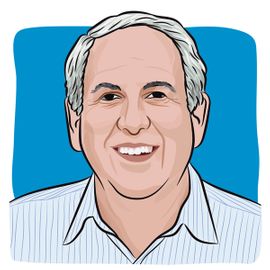- About Us
- Advertise / Support
- Editorial Board
- Contact Us
- CancerNetwork.com
- TargetedOnc.com
- OncLive.com
- OncNursingNews.com
- Terms & Conditions
- Privacy
- Do Not Sell My Information
- Washington My Health My Data
© 2025 MJH Life Sciences™ and CURE - Oncology & Cancer News for Patients & Caregivers. All rights reserved.
What I Do When My Doctors Don’t Listen

William Ramshaw resides in the expansive Pacific Northwest. He is a six-year survivor of pancreatic cancer and has written a memoir Gut Punched! Facing Pancreatic Cancer.
Here are four signs of your doctor not listening and four things I do when they don't listen to me.
As much as I want to believe my doctors are beyond brilliant and can do anything, they are people too. Much like me, they have good days and not-so-great ones.
Before finding out I had pancreatic cancer I rarely saw a doctor. Perhaps I would see my general practice doctor for an annual physical every three or four years. I should note when I turned yellow, it was this same general practice doctor who ordered an emergency CT scan, which likely saved my life.
Post-cancer, I see a raft of doctors. I see a gastroenterologist to monitor my digestive system which is a mess. Missing the top third of my pancreas courtesy of a Whipple procedure to extract my pancreatic tumor, I take enzymes to help me digest my food. I see an endocrinologist to track the progression of my diabetes. He also monitors my osteoporosis, courtesy of the abdominal radiation I had to help excise any post-surgery cancer cells. Did I mention I see a podiatrist who is tracking my peripheral neuropathy — loss of feeling — in my feet? Yet another side effect of my diabetes.
Perhaps it is not cancer-related, but I see a cardiologist who is wondering why my atrial fibrillation (AFib) instances are increasing.
As I told one of my doctors, I have doctor fatigue.
While many of my doctors listen most of the time, I’ve had instances where I’ve had to remind a doctor to listen to me rather than assume they understand what is going on. I live in my body. They don’t.
What are the signs your doctor isn’t listening?
- Constant interruptions. These can be subtle with words like the repeated use of “Uh huh,” “Uh huh, “Uh huh,” … But it can be more direct with the doctor cutting me off mid-sentence. Interruptions.
- Fidgeting. Let’s face it, most doctors are overscheduled. But this isn’t my fault. Hurriedness.
- There but not there. Looking away or worse: that vacant stare shows they have checked out and are wondering how many more patients they have to see before they can hit the road for home. Distractedness.
- Aggressive body language. Facial expressions of contempt are the worst. While I can understand the “why” behind this it makes it no less acceptable. Lack of respect.
I make sure my doctor is listening by:
- Being prepared. I always write out a bullet list of what I need my doctor to know. Like many, when the white coat opens the exam room door, my mind goes blank. Having a written list of changes in my medical situation, what I need help with, and questions I have, helps me stay focused and not ramble wasting my doctor’s time. Additionally, to prepare for my appointment, I often do a little research on my questions to help me have a discussion with my doctor rather than being told something I may or may not understand. Be prepared for your appointment.
- Being courteous. One never knows what kind of day a doctor is having. Minutes earlier they could have had a tense discussion with another patient or worse things may be happening to them or someone in their family they simply can’t talk about. Give them the benefit of the doubt. Be courteous.
- Rewinding the conversation. If I find my doctor is not listening, I have found it helpful to use words like, “Can we rewind this conversation?” and restate my point. If needed, rewind the conversation.
- As a last step, change doctors. I rarely have to take this type of drastic measure, but there are times when changing doctors is necessary. Doing this doesn’t need to be a confrontation but rather it can be handled with a comment to one of the doctor’s schedulers, “I would like to see a different doctor. Who might you recommend?” When asked why? I simply say, “‘Name-of-the-doctor’ and I are not working well together.” There is no need to provide details. The doctor is there to provide care to a patient. If you feel the care needed is not being provided, change doctors.
Rather than shrink back from having a “tough” conversation with a doctor, it is critical to do just that. Often these types of conversations, rather than ending a relationship with a doctor, strengthen it.
So, if you find your doctor isn’t listening to you, show up prepared for your appointments, always be courteous, rewind the conversation when necessary and most of all, don’t hesitate to change doctors if nothing else works.
For more news on cancer updates, research and education, don’t forget to subscribe to CUR don’t E®’s newsletters here.
Related Content:


